- Home
-
Overview
- Study Guide
- The Single Most Important Idea
- Mission Statement
- War Is Not Inevitable keynote speech
- Capstone Essay: "To Abolish War"
- An Action Plan
- The Nine Cornerstones
- How Far We Have Already Come
- The Secret Ingredient
- The Vision Thing
- How Long It Will Take
- What You Can Do
- The AFWW Logo Explained
- Examples of War Expenses
- Biological Differences
- What Makes People Happy
- Map of Non-warring Cultures
- Cornerstones
- Videos
- Books
- Blog
- Project Enduring Peace
- About
- Related Projects
- Contact
|
Global Women Leaders Flex Security Muscles in New York City Judith Hand  Jumeirah Essex House Hotel Jumeirah Essex House Hotel On November 15-17 of 2007, over seventy five women—current and former heads of state, influential ministers, and leaders of inter-governmental and non-governmental organizations—were invited to the first International Women Leaders Global Security Summit at the Jumeirah Essex House Hotel in New York City. This may prove to be a pivotal historic event. The stated goal was to provide women leaders a forum to discuss, evaluate, and endorse meaningful strategies for global security. For reasons explained in two books and on this website, the creation and maintenance of social stability is a priority of special importance to women, and we have arrived at a moment in history where many women have sufficient influence and power to begin to address security issues with authority. (Hand 2003, Women, Power and the Biology of Peace; 2018 War and Sex and Human Destiny) Perhaps we have reached an historical "tipping point." 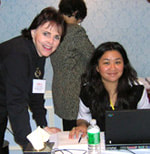 Judith Hand - Press Room Sign-In Judith Hand - Press Room Sign-In I attended as an observer and was struck with the sensation that this conclave resembled the seminal meeting of July 19-20, 1848, when some three hundred women and roughly forty men met in Seneca Falls, NY, to consider the denial to women of the right to vote. The Seneca Falls Convention was a first-of-its-kind meeting in the United States of America and is generally considered to be the origin of this country’s suffragist/feminist movement. The participants arrived by buggy and coach to the Wesleyan Chapel. Among those present were Elizabeth Cady Stanton and Lucrecia Mott, two of the meeting’s five co-organizers. Noted slavery abolitionist Frederick O. Douglass was among the forty or so supportive men. That meeting energized what would be women’s long battle in the United States to win the right to vote. 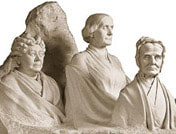 Adelaide Johnson statue of (left to right) E.C. Stanton, S.B. Anthony, and L. Mott Adelaide Johnson statue of (left to right) E.C. Stanton, S.B. Anthony, and L. Mott The Seneca Falls participants adopted a "Statement of Sentiments," (see below) modeled on the U.S. Declaration of Independence. Its opening included a key modification to the famous phrase from the original: "We hold these truths to be self-evident: that all men and women are created equal." The document ended as follows: "In entering upon the great work before us, we anticipate no small amount of misconception, misrepresentation, and ridicule; but we shall use every instrumentality within our power to effect our object. We shall employ agents, circulate tracts, petition the State and national Legislatures, and endeavor to enlist the pulpit and the press in our behalf. We hope this Convention will be followed by a series of Conventions, embracing every part of the country. Firmly relying upon the final triumph of the Right and the True, we do this day affix our signatures to this declaration." 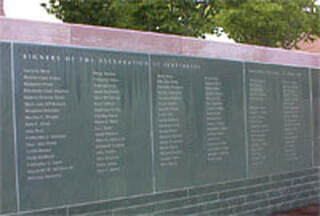 Signers of "Declaration of Sentiments" Signers of "Declaration of Sentiments" Sixty-eight women and thirty-two men signed. The Essex House global security summit meeting, which drew together a large number of highly influential women from all parts of the globe, was also a first-of-its-kind event. Sessions that included all attendees were held along with smaller working groups. The organizers identified four issues on which to concentrate efforts to create a world where all persons live free from fear and want (details are supplied in the CALL TO ACTION included at the end of this report):
Particularly relevant was that these women of power and high status emphasized the crucial importance of working together to negotiate non-violent solutions to both domestic and international disputes, and that their task and commitment would most especially be to reach out to local women and ask for their input, ask what they need to make change happen in their communities. As Madeleine Albright, former United States Secretary of States, said, "Security can only be built from the ground up." This is a significant change in approach to matters of security which are now usually addressed from the top down. 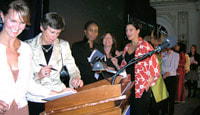 Signing the Call to Action, Jumeirah Essex House, 2007 Signing the Call to Action, Jumeirah Essex House, 2007 During the dinner gala, Poet Laureate, Maya Angelou, delivered a reading of the essence of the CALL TO ACTION (via video recording), and at the dinner’s conclusion, all persons willing to commit to these actions were invited to sign. This included the official delegates plus their aides and other observers. It was as I signed that I felt the uncanny sense of the similarity to Seneca Falls. Given the stature of the delegates, I also felt an enormous surge of hope and inspiration: perhaps, like the meeting at Seneca Falls, this was the beginning of something big, a major shake-up in our approach to human security. In the case of Seneca Falls, the result 72 years later was the passage in 1920 of the 19th Amendment to the U.S. Constitution which granted women the right to vote. It’s my hope, the hope of A Future Without War, that this meeting of wives, mothers, and grandmothers who are proven leaders will ultimately result in the abolition of war. 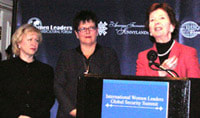 Kim Campbell, Prime Minister of Canada (1993) (left) and Mary Robinson, President of Ireland (1990-1997) right)) Kim Campbell, Prime Minister of Canada (1993) (left) and Mary Robinson, President of Ireland (1990-1997) right)) The labor required to facilitate this gathering was provided by four organizations of vision:
 Angelique Kiddo Angelique Kiddo Stars added sparkle and shine to the gala. The powerful voice of Beninese singer Angelique Kidjo touched hearts and got bodies swaying in the shared joy of song. The lovely and imposing actress Geena Davis, who convincingly portrayed the first woman president of the USA on the television show "Commander-in-Chief," introduced an inspiring trailer for a film documentary on "Real Security," to be released in 2008 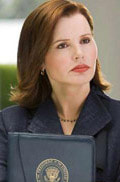 Geena Davis Geena Davis It’s the conviction of my project, A Future Without War, that 1. We can abolish war – there is no biological impediment to doing so. What is required is the will to alter aspects of our dominator cultures that foster war, and 2. The sane course of action is to abolish war. War devours resources needed to address all of the concerns of these conference attendees, and 3. The united efforts of all possible leaders—women and men—will be needed to wage this great campaign, and 4. No single cause could so powerfully unite the global community—legions of organizations, governments, and individuals—than a call to participate in the global campaign to abolish this avoidable evil. Were the efforts of these legions united in common cause, nothing could stop that massive cultural shift from taking place. This security summit did not adopt as a goal the abolition of war. Viewed in total, however, the CALL TO ACTION is precisely a description of goals to advance us well along the path to a just society in which all people live free from want and fear of violence, including the violence war. The CALL TO ACTION embraces many elements of eight of AFWW’s nine cornerstones (AFWW Cornerstones), lacking only the commitment to EMBRACE THE GOAL. No great cause can go forward without a plan and leaders determined to execute it. Earlier visionaries waged campaigns that at first were thought impossible—e.g., to abolish the British slave trade, to win for women the right to vote, to free India from British Rule, to end segregation in the American south, to end apartheid in South Africa. It’s my hope that at some future meeting of these women, they will expand their mandate and draw up a global PLAN OF ACTION to abolish war. And once having a plan, I hope to see these visionaries create an organizational structure to ensure that the campaign, once begun, is continued until the goal is achieved. It is the hope of A Future Without War that at some time in our future, people will look back to this meeting at the Jumeirah Essex House in New York City in 2007 as a pivotal moment when dominator, violent models of living began a swift decline and ultimate fall. Judith L. Hand 1 December 2007 INVITED PARTICIPANTS and CALL TO ACTION follow:
Co-Hosts
International Women Leaders Global Security Summit - 2007 Call to Action We, the participants of the International Women Leaders Global Security Summit, share a common vision for a more secure, peaceful and just world. Our different cultures and backgrounds are unified by our common sense of urgency and shared resolve to ensure that all people may live free from fear and want. We commit to supporting effective policies that increase human and state security and challenge affronts to both. We recognize that the people of every nation deserve an accountable government, and a security system that provides for its own defense and sustains the safety and well being of its citizens. Nevertheless, in a world where threats to peace are not contained by borders, military force must not be the only tool used to address insecurity. An over-reliance on military solutions diverts resources--both financial and human--away from solutions that favor prevention and persuasion over coercion and force. The arms industry and the proliferation of small arms carry a high human and economic toll that undermines human rights, diverts resources and encourages violence. Recognizing that expanding defense budgets do not buy greater security, we call on governments to create a balanced response to security that accurately reflects today's real security threats and creates the momentum for long-term solutions. The imperative to act could not be more urgent. Tens of thousands of people die each day from hunger and poverty-related causes, including 30,000 children under the age of five from preventable disease. Over 1.6 million people die each year from violence, of which 90% live in developing countries. In every country, women experience and sometimes die from gender-based violence and sexual assault, with systematic rape increasingly visible as a weapon of war. Eradicating threats such as terrorism, HIV/AIDS, environmental degradation, grinding poverty and pandemic disease require the energies of all leaders—both women and men. Security cannot be effectively discussed or achieved with the involvement of only half of humanity. The accumulated experiences of women leaders now rising to power must be brought systematically to bear on local, national and international security policy. As women leaders, we commit ourselves to ensuring that the realities of women who do not have access to power inform our actions. Anything less would be a waste of resources, and an act of unconscionable neglect. We call on both governments and individuals to effectively use the local, regional and international tools already in our hands, such as United Nations Security Council Resolution 1325, internationally agreed human rights standards including CEDAW, and evolving norms such as the Responsibility to Protect, which are endorsed by heads of government and the international community. Similarly, policies that address the common ground shared by development and security are widely recognized as good practice, and should increasingly provide the framework for defense and economic strategies. There is an urgent need to strengthen the application of these tools. We call on leaders to use them as designed: consistently, jointly and in global unison. Policymaking on security will then be squarely rooted in human rights principles and international law. We can also further strengthen their implementation by supporting reform at the UN that calls for a stronger, consolidated body for women’s rights and empowerment that operates robustly at the global policy and field levels. We also recognize that global business can play a role in addressing global insecurity. With influence that transcends the boundaries and power of governments, the private sector should be held accountable for abuses and called upon to contribute to the positive objectives of governments, empowering women and fulfilling human rights for all. As leaders, we now exercise our collective agenda-setting power to detail changes we know will contribute to a more secure and just world. We commit to asserting our individual and collective political will to ensure these recommendations are widely implemented. We have identified four issues on which to concentrate our collective efforts toward global security. To address the economics of insecurity, we will partner with other leaders to:
(This Call to Action was signed by over 100 women and a number of men)
1 Comment
12/14/2022 12:57:34 am
Excellent article! Thank you for your excellent post, and I look forward to the next one. If you're seeking for discount codes and offers, go to couponplusdeals.com.
Reply
Leave a Reply. |
Follow Me on Facebook
If you'd like to read my take on current affairs, or get a sense of what amuses me or I find educational or beautiful, do a search and follow me, Judith Hand, on Facebook. About the AuthorDr. Judith L. Hand. Dr. Hand earned her Ph.D. in biology from UCLA. Her studies included animal behavior and primatology. After completing a Smithsonian Post-doctoral Fellowship at the National Zoo in Washington, D.C., she returned to UCLA as a research associate and lecturer. Her undergraduate major was in cultural anthropology. She worked as a technician in neurophysiology laboratories at UCLA and the Max Planck Institute, in Munich, Germany. As a student of animal communication, she is the author of several books and scientific papers on the subject of social conflict resolution.
Categories
All
Archives
November 2019
|
A Future Without War
Believe in it. Envision it. Work for it.
And we will achieve it.
Believe in it. Envision it. Work for it.
And we will achieve it.
AFWW is continually developed and maintained by Writer and Evolutionary Biologist Dr. Judith Hand.
Earth image courtesy of the Image Science & Analysis Laboratory, NASA Johnson Space Center. Photo Number AS17-148-22727 eol.jsc.nasa.gov
©2005-2019 A Future Without War. All rights reserved. Login
Earth image courtesy of the Image Science & Analysis Laboratory, NASA Johnson Space Center. Photo Number AS17-148-22727 eol.jsc.nasa.gov
©2005-2019 A Future Without War. All rights reserved. Login
- Home
-
Overview
- Study Guide
- The Single Most Important Idea
- Mission Statement
- War Is Not Inevitable keynote speech
- Capstone Essay: "To Abolish War"
- An Action Plan
- The Nine Cornerstones
- How Far We Have Already Come
- The Secret Ingredient
- The Vision Thing
- How Long It Will Take
- What You Can Do
- The AFWW Logo Explained
- Examples of War Expenses
- Biological Differences
- What Makes People Happy
- Map of Non-warring Cultures
- Cornerstones
- Videos
- Books
- Blog
- Project Enduring Peace
- About
- Related Projects
- Contact

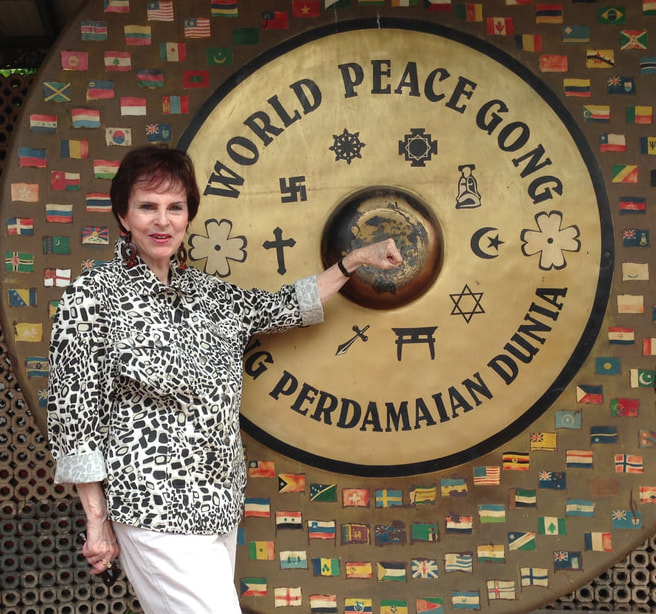
 RSS Feed
RSS Feed